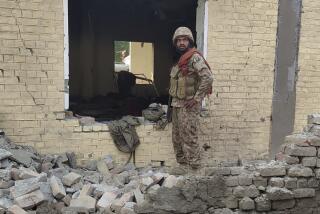12 killed as suicide car bomber hits NATO convoy in Kabul
- Share via
KABUL, Afghanistan -- A powerful suicide car bomb rocked Kabul on Thursday, killing six foreigners and at least six Afghan civilians, according to local officials.
The attack took place around 8 a.m., a time when many people in the Afghan capital were commuting to work. Six civilians were killed and 35 wounded, said Gen. Mohammad Daud Amin, deputy chief of the Kabul police. Other officials said as many eight people were killed.
Mohammad Ayob Salangi, Kabul’s police chief, said the attack occurred when a suicide bomber in a Toyota Corolla pulled up beside a NATO convoy.
John Manley, a spokesman for the NATO-led international coalition, said the six foreign deaths were two troops and four civilian contractors. He added that it wasn’t immediately clear who was targeted in the blast, which remained under investigation.
In a statement, U.S. military contractor DynCorp International confirmed that the four deceased civilian contractors and three of the wounded were its employees. They were in Afghanistan working on a program to help train Afghan security forces.
Footage of the scene showed the road scattered with debris from torn-apart vehicles in front of several houses damaged or destroyed as firetrucks and police vehicles combed the wreckage and tended to the injured.
Pakistan-based Zubair Sediqqi, spokesman for the Hezb-e-Islami Gulbuddin, claimed responsibility for the attack, claiming that a suicide car bomb targeted a convoy, killing more than 10 foreigners. “Our party will increase its attacks against foreign troops in Afghanistan in the future,” he added.
Insurgent groups in Afghanistan have a history of taking questionable credit for attacks done by others and exaggerating claims.
Sediqqi added that the group was also targeting Afghans working with foreigners in Afghanistan. In September, it claimed responsibility for a suicide car bombing that killed 12 people.
Founded in 1977, Hezb-e-Islami Gulbuddin was initially engaged in fighting the Soviets. The group was forced out of Kabul by the Taliban in the mid-1990s, then found a new mission after 2001, according to the “Columbia World Dictionary of Islamism,” when it aligned with remnants of the Taliban and Al Qaeda to fight the government of President Hamid Karzai.
In April, the Taliban said it was stepping up attacks on international troops and diplomatic targets as part of its spring offensive, when insurgent strikes tend to increase as the weather improves.
Local authorities said several of the dead civilians in Thursday’s attack were women and children.
The last explosion in Kabul took place in March, when Taliban suicide bombers killed nine civilians lining up outside the Afghan Ministry of Defense during the visit of U.S. Defense Secretary Chuck Hagel.
This latest attack comes as Afghan forces take more responsibility for the nation’s security as foreign combat troops prepare to leave Afghanistan by the end of 2014.
ALSO:
Chinese military unit said to resume cyber spying
Obama administration to tighten pressure on Iran, aide says
Global Voices: Palestinian quest for statehood a moving target
More to Read
Sign up for Essential California
The most important California stories and recommendations in your inbox every morning.
You may occasionally receive promotional content from the Los Angeles Times.










